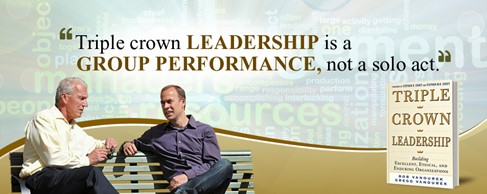“Life’s a dance, you learn as you go. Sometimes you lead, sometimes you follow.”
-song lyric by John Michael Montgomery
Which are you: a leader, manager, or follower?
More importantly, which should you be? Can you be them all? Should you? It’s an important choice.
Too often, leadership is lionized while management and followership are disparaged. Big mistake.
We submit that great leadership is a situational blend
of leading, managing, and following.
Manager
Traditional notions of management involve:
- Planning, budgeting, administering, staffing, organizing, directing, and controlling boundaries
- Being task- and object-oriented
- Using “head” skills such as financial or operational expertise
- Being more concerned with stability, efficiency, bottom-line results, and the short-term
- Being focused on problem-solving, tactical issues, keeping emotional distance from people, using position power, and telling people what to do
- Asking “how” and “when”
Many people use “management” and “leadership” interchangeably, but there are important differences between them, even though both are needed for organizations to function well. There are hundreds of definitions of leadership and adjectives that describe the leadership (visionary, charismatic, servant, transformational, etc.).
Leader
Traditional notions of leadership involve:
- Innovating, synthesizing, inspiring, aligning, and reducing boundaries
- Being more people- and change-oriented
- Using “heart” skills such as character, empathy, courage, and emotional intelligence
- Focusing on opportunities, what might be possible, and the long-term
- Focusing on strategic issues, connections with people, listening, asking questions, helping others grow, and serving
- Asking “what” and “why”

Leadership Derailers Assessment
Take this assessment to identify what’s inhibiting your leadership effectiveness. It will help you develop self-awareness and identify ways to improve your leadership.
Follower
Followers are essential for any organization. But passive followers are not as useful to achieving organizational objectives as engaged followers.
Passive followers are:
- Not particularly loyal, committed, connected, or engaged
- They take direction, do what they are told, and sometimes deliver results
- They work independently
- They are reactive, compliant, and more personally driven
- They often say, “That’s not my job”
Engaged followers on the other hand are invaluable to an organization.
Engaged followers are:
- Loyal, committed, connected, and engaged
- They take direction but they use their initiative, follow through, and hold themselves accountable to deliver results
- They collaborate
- They are proactive, reliable, professional, diligent, and thorough
- They often say, “I’ll help with that,” even if it isn’t in their job description
Different Roles
Manager, leader, follower: different roles. But the complexity of organizational dynamics does not allow for clear separation of these roles.
At the best, people are not only leading, or managing, or following. These activities ebb and flow in the same person, depending on the situation, the people, and the choice of the person. A dynamic dance.
Sometimes we must lead. And sometimes we must manage. Sometimes we must follow. They go hand in hand—more than we think.
- Those who are always leading may miss important opportunities to help others develop their own leadership abilities and may neglect the tactical issues of keeping the trains running on time.
- Those who are always managing may miss opportunities to see beyond the current fray and help the organization and its people rise to a new level.
- Those who are always following may miss the chance to learn, grow, and stretch themselves by taking on challenges and risks and fighting for larger causes.
Core Concept
Great leadership is a blend of leading, managing, and following.

Reflection Questions
- What role do you play most often at work: leading, following, or managing?
- What’s keeping you from exploring and integrating other roles?
Tools for You
- Leadership Derailers Assessment to help you identify what’s inhibiting your leadership effectiveness
- Personal Values Exercise to help you determine and clarify what’s most important to you
- Alignment Scorecard to help you assess your organization’s level of alignment

Triple Crown Leadership Newsletter
Join our community. Sign up now and get our monthly inspirations (new articles, announcements, opportunities, resources, and more). Welcome!
+++++++++++++++++++++++
Gregg Vanourek and Bob Vanourek are leadership practitioners, teachers, and award-winning authors (and son and father). They are co-authors of Triple Crown Leadership: Building Excellent, Ethical, and Enduring Organizations, a winner of the International Book Awards. Check out their Leadership Derailers Assessment or get their monthly newsletter. If you found value in this, please forward it to a friend. Every little bit helps!

